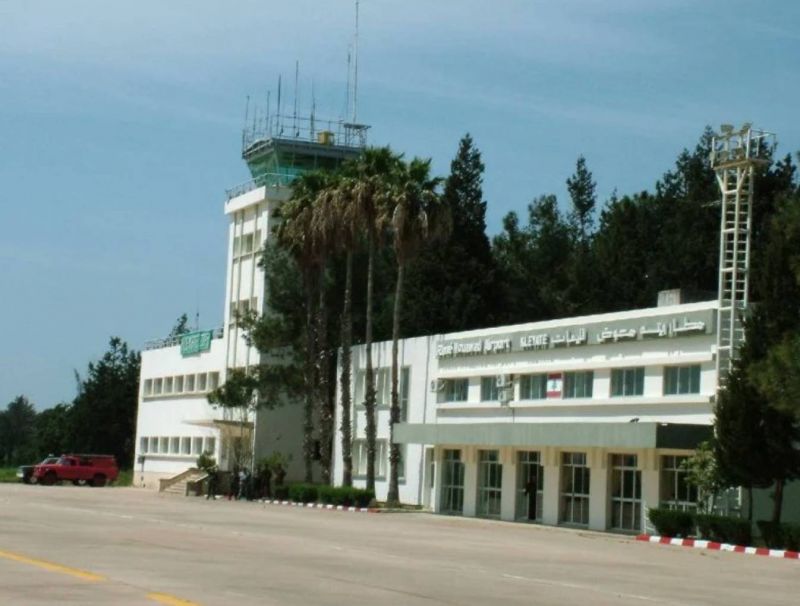
Qlayaat airport, Akkar, North Lebanon. (Credit: Michel Hallak)
Amidst the wait for an end to the presidential deadlock, a group North Lebanon MPs, known as the National Moderation bloc, have been fighting for the reopening of the Qlayaat airport in Akkar, which is officially known as the René Moawad airport, named after the first post-Taif president who was elected there in 1989.
Besides the potential economic benefits involved, the battle to reopen airport has an undeniable political dimension.
The National Moderation bloc MPs, once affiliated with the Future Movement, are waging their battle in a context of division surrounding the presidential elections. As it seems, these North Lebanon Sunnis hold the power to tip the balance in the election battle in either direction.
Although the initiative has received support from most political actors, it has come up against one obstacle: Hezbollah. The organization which currently holds the Public Works and Transportation Ministry, is not pleased with the idea of opening an airport outside its area of influence.
Since July, the ex-Future Movement parliamentary bloc has been advocating for the reopening of the Qlayaat airport, which has become an air base for the Lebanese army.
The bloc has even consulted Parliament Speaker Nabih Berri and caretaker Prime Minister Najib Mikati.
“All the actors are aware of the importance of reviving this airport. So, no one can oppose our request,” Sagih Attieh, a member of the National Moderation bloc and chairman of the parliamentary Public Works Committee, told L’Orient-Le Jour.
“The Qlayaat airport is important for the economic growth of a region that has long been neglected by the state,” Attieh added.
This is why an overwhelming majority of political actors have expressed their support for the initiative.
“We are in favor of this project, which would provide job opportunities for young Lebanese,” said Lebanese Forces (LF) spokesman Charles Jabbour.
The Free Patriotic Movement (FPM) head, Gebran Bassil, also expressed his support for the project. “He even said he was ready to put all the FPM’s capacities at our disposal so that this struggle can bear fruit, without asking for anything in return,” Hadi Hobeish, former MP for Akkar and secretary general of the National Moderation bloc, told L’Orient-Le Jour.
The FPM’s position is far from surprising. Decentralization is one of Bassil’s major goals. Administrative and financial decentralization are at the heart of the presidential dialogue currently underway between the FPM and Hezbollah.
Hezbollah’s apprehension
It was actually Berri’s support that came as a surprise.
“During our meeting with him, he said that his [caretaker] ministers would vote in favor of the draft law once it was on the agenda of a cabinet meeting, even if Hezbollah did not give the green light,” Hobeish said.
Is this a new point of contention between the two Shiite allies? Hobeish pointed out that Amal and Hezbollah disagreed on a number of issues in the past.
Mikati on the other hand, does not want to tackle the Qlayaat airport project without Hezbollah’s blessing. “Mikati has promised to include this item on the agenda of the next cabinet meeting,” said Attieh.
“But he asked us to take Hezbollah’s pulse first,” added Hobeish, who believes that Mikati “wants to avoid another upheaval to his team.”
Meanwhile, Hezbollah seems to have mixed feelings. “I was able to get the party’s initial approval. During a meeting of the public works committee, Hussein Hajj Hassan [a Hezbollah MP] spoke in favor of reactivating the airport. And I was keen to record this in the minutes of the meeting,” said Attieh.
Yet, the head of Hezbollah’s parliamentary bloc, Mohammad Raad, did not give the green light. “To us, he mentioned some security concerns, as the party fears that terrorists affiliated to the Islamic State group (IS) might take advantage of the Qlayaat airport to infiltrate Lebanon,” said Hobeish.
Beyond that, it seems clear that Hezbollah does not want its monopoly over the Beirut International Airport, located in the heart of its stronghold, to be broken for the benefit of a region it has little concern over.
Hezbollah MP Hussein Jashi dismissed this argument. “We do not control the airport’s security. That’s a task that falls within the state’s authority,” he said.
“But we want to study the project because we are against anything that could be part of plans that could lead to federalism,” Jashi added, in a dig at the Christian parties, including the LF, which Hezbollah accuses of wanting partition.
“The future of René Moawad airport depends on Hezbollah. And it is Hezbollah that would be blamed for any obstacle to the process,” said Hobeish.
Hobeish's colleagues in the National Moderation bloc are fully aware that their choice (among others) will determine the fate of the presidential elections and intend to play this card carefully.
“We know that now is the time for our pressure to bear fruit,” said Attieh, stressing that his bloc “will vote against any candidate who does not commit to putting the Qlayaat airport project on track.”
Is this why Sleiman Frangieh’s Marada bloc is in favor of the project?
This article was originally published in French in L'Orient-Le Jour. Translation by Joelle El Khoury.

